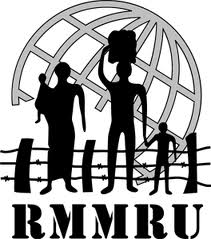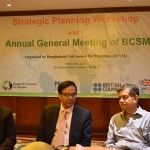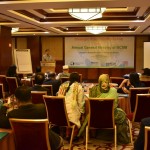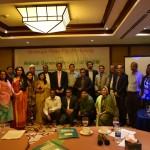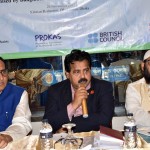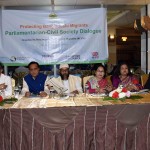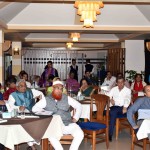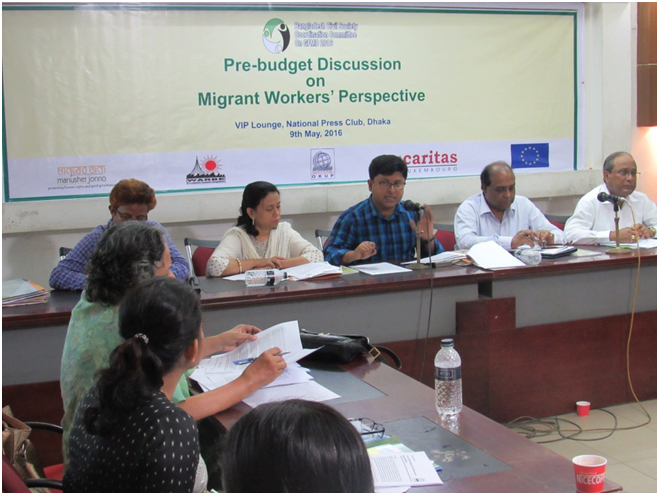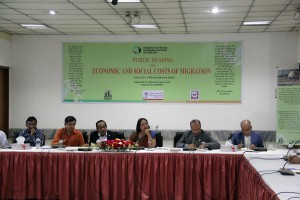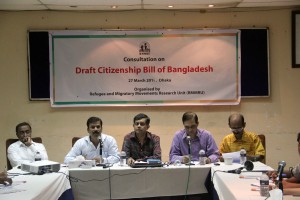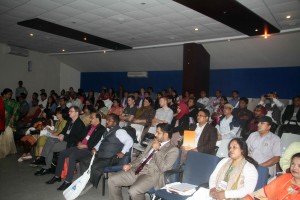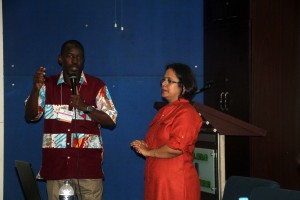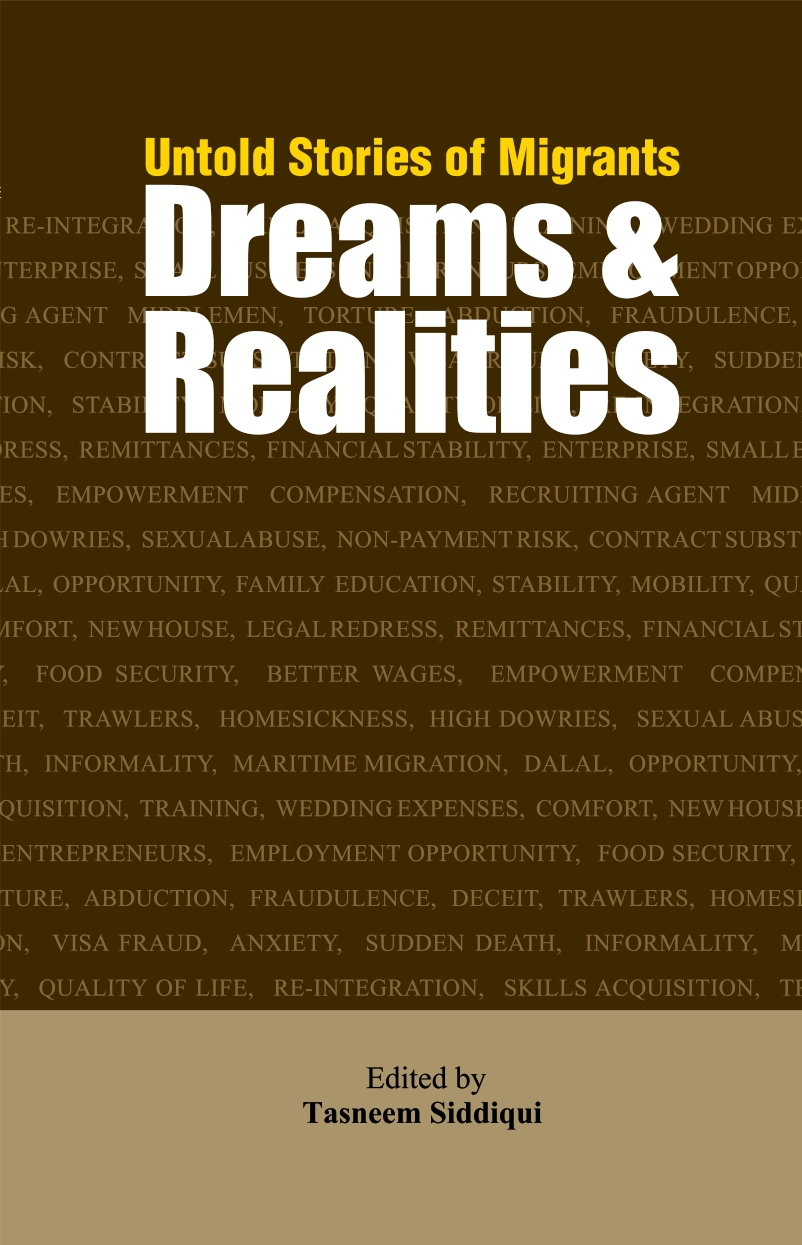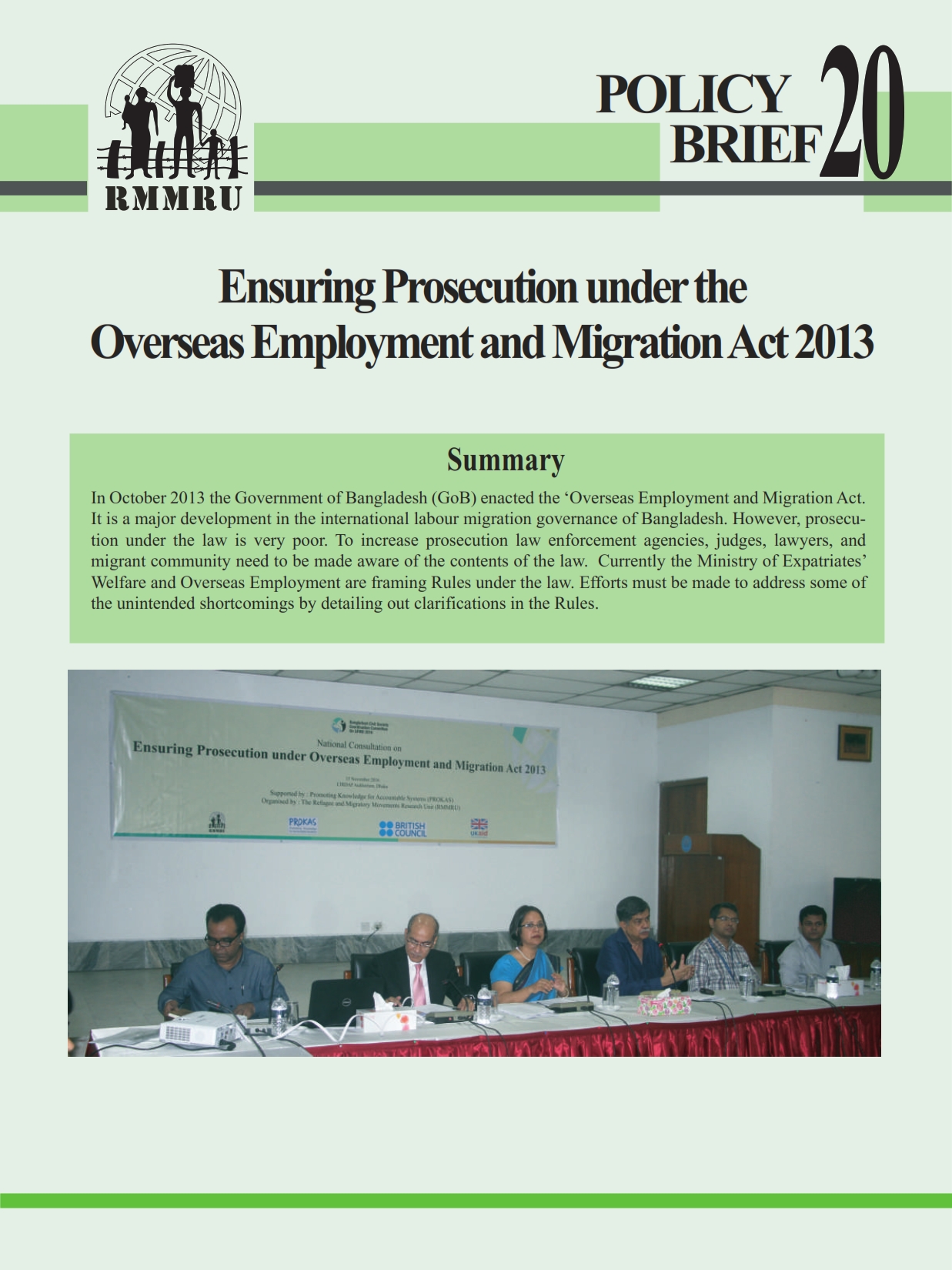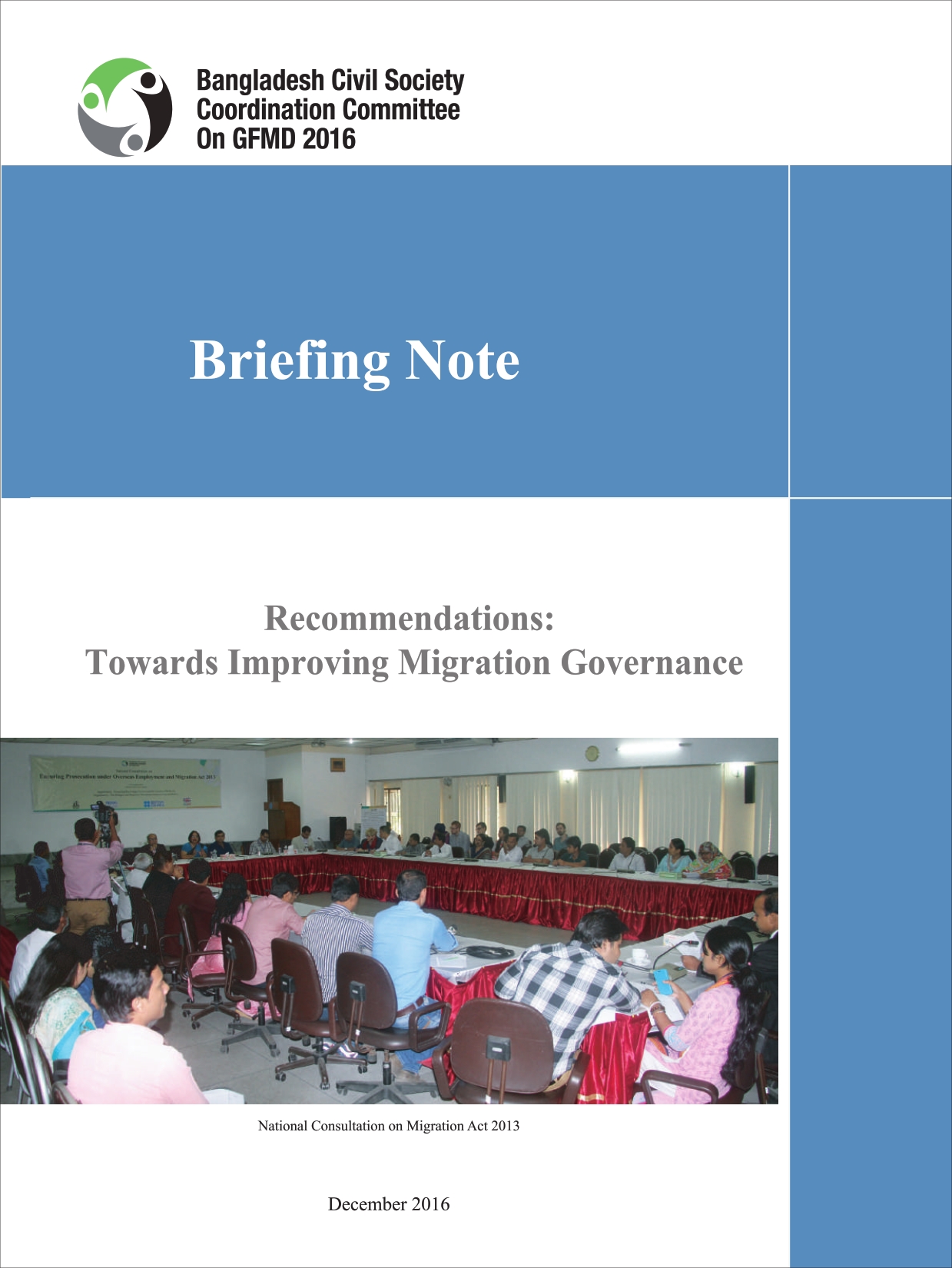Venue: Six Seasons Hotel, Gulshan-2
Organised by: Bangladesh Civil Society for Migration
C R Abrar, Chair of BCSM formally welcomed BCSM members to workshop which focused on partnership of member organisations to achieve SDG and GCM in Bangladesh and was facilitated by Asif Munier. Participants from ASK, BASUG, BRAC, BOMSA, IMA Research Foundation, BCWWF, MJF, INAFI, YPSA, BASTOB, BOAF, WARBE DF and RMMRU along with three individual members of BCSM were present in the workshop and pointed out key milestones of this platform since its formation in 2016. Dividing into two groups, the members noted strength, weakness, opportunities, and challenges and presented them. Later, they took part in roots and fruits exercise for common vision of the platform.
Ms. Shirin Lira, Prokas expected the roles of this platform would help achieve SDG and GCM.
The Annual General Meeting of BCSM was held afterwards where members discussed about amendment of charter, membership and other organisational matters.
Mr. Salim Reza, Honourable Secretary of Ministry of Expatriates Welfare and Overseas Employment joined in the concluding session of the event. He expected this civil society platform will stand together with the newly taken initiatives by the ministry.
Place: Xinxian Restaurant, Dhanmondi
Organized by: Bangladesh Civil Society for Migration
C R Abrar, Chair of BCSM formally introduced BCSM to the Parliamentarian Caucus and Co-Chair; Syed Saiful Haque highlighted the background of the platform. Afterwards, Dr. Tasneem Siddiqui presented a power point presentation on major policy engagement of this platform.
Participants from ASK, BASUG, BRAC, BOMSA, IMA Research Foundation, BCWWF, MJF, INAFI, YPSA, BASTOB, Rights Jessore, BOAF, WARBE DF and RMMRU along with individual members of BCSM were present in the dialogue and denoted their opinion about skilled migration, recruitment in Malaysia and new job markets issues in front of the Caucus.
Mr. Gerry Fox, Team Leader, Prokas expected the collaboration would help achieve SDG and GCM.
Mr. Israfil Alam, honourable Member of Parliament and Chair of Parliamentarian Caucus on Migration and Development expressed his gratitude to BCSM for its policy engagement on behalf of civil society. Pointing out some current issues such as high migration cost and vulnerability of female migrants in KSA, he signified the scope of work in collaboration with BCSM.
Organized: Ovibashi Karmi Unnayan Program (OKUP)
Date: 28th of July, 2016
Venue: CIRDAP Auditorium, Dhaka
The consultation presented a documentary on Health Issue of Migrants entitled The Pain: Does anybody care for us? Numbers of returnee migrant workers including those who returned with different forms of sickness, injury, accidents from overseas job participated and shared their practice experiences regards to discrimination in access to health care and treatment in the receiving countries. They also shared how much are they neglected in access to treatment and care upon return and how the dream of better life does turned into nightmare. A policy paper entitled The Human Rights of Health Care A Perspective on the Health Reform for Migrants prepared and developed by OKUP also presented in the consultation for the basis of open discussion.
The Policy Paper highlighted the loopholes and gaps in the National Health Policy 2011, the Overseas Employment and Migrants Act 2013, the Expatriate Welfare and Overseas Employment Policy 2016 related to the needs of human rights of health care and treatment of Bangladeshi Migrant workers. The paper raised questions about the indifference of concerned governments of labour sending and receiving countries, the employers and so on regards to human rights of health care when the migrants are must undego mandatory health test before recruitment and every time they require extension of their employment visas. The paper termed DEPORTATION or FORCED RETRUNE on the ground of sickness and diseases without Health Care and Treatment is a clear violation of universal and equitable health care.
Around 75 participants including the representatives of different national and international organizations from the IOM, ILO, Manusher Jonno Foundation and INAFI Bangladesh attended the consultation and took part as the key panel guests.
The discussants and the participants of the consultation reinforced that the government of Bangladesh must take necessary actions to development and implement a Framework of Comprehensive Health Package which must comprise of pre-departure health education, treatment and care coverage in the labour receiving countries, and also institutional health care system as well as economic rehabilitation for those who return back with different health problems. The government of Bangladesh must review its existing laws and policies to make it migrant-sensitive and also undertake bi-lateral and multilateral agreements for the protection of health rights of migrant workers. It also recommends that the government must maintain database of the returnee migrant workers in order to know the health status of the returnee migrant workers.
Organized: Ovibashi Karmi Unnayan Program (OKUP)
Date: 9th May, 2016
Venue:VIP Lounge, National Press Club, Dhaka
Aiming to raise the migrants concerns over the budgetary allocation for their protection and welfare, OKUP had undertaken a research entitles Overview of National Budget: Does the State Care the Migrants Wellbeing in 2016. Based on that research, Ovibashi Karmi Unnayan Program (OKUP) jointly with WARBE Development Foundation organized a national level advocacy consultation on the eve of the upcoming national budget preparation. The consultation was held on 9th May, 2016 at the VIP Lounge of the National Press Club, Dhaka under the banner of Bangladesh Civil Society Coordination Committee (BCSCC) on GFMD 2016.OKUP Chairman, Shakirul Islam presented the major findings of the research in the national consultation as the key note presenter. The Additional Secretary of the Ministry of Expatriate Welfare and Overseas Employment (MoEWOE), Mr. Jabed Ahmed attended the consultation as the Chief Guest, while the consultation was moderated by WARBE Chairman Mr. Saiful Haque. Representatives attended as penal discussant from different rights organizations as well as recruiting agencies include Migration Program Manager of Manusher Jonno Foundation, Secretary General of WARBE and Executive Director of OKUP as well as INIFI Bangladesh and also the Vice-President of BAIRA.
Following the presentation, the Penal speakers, the participants as well as the chief guest shared their insights. WARBE Chairman Syed Saiful Haque said in terms of contribution of migrant workers to the national economy, the budget allocation is very insignificant. The government must allocate national budget on the ratio of net earnings from each sector, he added. Ali Haider Chowdhury, senior vice president of Bangladesh Association of International recruiting Agencies (BAIRA) said, other labour-sending countries give incentives to the wage earners while the Bangladesh has no such incentives for the migrants. He remanded for special quota for migrant workers children in the educational institutions.
Faruque Ahmed, Secretary General of WARBE said the government does not consider sacrifices of the migrant workers. It only likes to count the remittances while Omar Faruque Chowdhury, Executive Director of OKUP suggested to the rights activists to raise strong and collective voice to press the demand uphold and proposed handing over a memorandum to the Prime Minister about the sufficient allocation of budget for the migrant workers. Nazma Akter, president of the Garment Workers Federation also emphasized the union of migrant workers to push their demands united and strong.
Atiqun nabi, Executive Director of INAFI Bangladesh mentioned about the high transaction cost of remittance on one hand and no special incentive on the other discourage many migrant workers to send remittances through proper channels. Sarowat Binte Islam of MJF pointed out that the government must have proper budgetary provisions to make available migration related information and services from grassroots level to District level. She demanded the government must allocate enough budgets to improve and upgrade trainings for women migrant workers and necessary incentives for economic reintegration of the returnees through the self-help groups of the migrants. Parvez Siddique of brac migration program questioned if the concerned ministry had appropriate skills to prepare migrant-friendly budget? He proposed the ministry should take participatory approach to prepare the budget for the ministry in cooperation and collaboration with the active organizations in the migration sector. Christian Wolf of DanChurch Aid also attended the consultation and pointed out the importance of recently completed SAARC regional Consultation on Migration in order to initiate joint actions for the betterment of the migrant workers.
Mr. Jabed Ahmed, additional secretary of the MoEWOE, admitted the low allocation of budget for his ministry despite the huge contribution of migrant workers in the national economy. He acknowledged the governments limitations in ensuring protection and wellbeing of the migrants and also the lack of skill gap in preparing the budget. He called upon the concerns CSOs to come forward to and work together with the ministry to make migrant-friendly national budget. Mr. Ahmed, however, pointed out numbers of positive initiatives that the ministry and the government has already done and/or undertaken within its limited resources i.e. increase the numbers of labour wings. He pointed out the honorable Prime Ministers recent declaration of establishing nine special schools for the migrants children in nine cities of Saudi Arabia, as well as the establishment of vocational training centers in each Upazila (sub-district).
The consultation ended with an expectation to draw more budgetary concentration for migrant workers in National Budget 2016-17 in line with the set of recommendations pointed out in the research paper presented in the consultation.
The consultation was covered duly by several national newspapers including The Daily Star, The Daily Prothom Alo, The Daily New Age, The Financial Express, Bangladeshnew24.com, Sampadona.com etc.
- Government should take initiative to make all kinds of migration related information available at union level
- Overview
The discussants in a roundtable on 'Irregular Migration: Prevention and Responsibilities' recommended that the government should take initiative to make all kinds of migration related information available at union level. It was held on 16 May, 2016 at DC conference room, Khulna organized by BRAC Migration Programme in association with Bangladesh Civil Society Coordination Committee on GFMD-2016. Purpose of Round Table Discussion was to determine the role and responsibilities of relevant stakeholders at district and divisional level to prevent irregular migration and to create mass awareness on safe migration among community people as well.
Mr. Md. Jahangir Hossain, Additional Deputy Commissioner, Khulna was present as the Chair where Md. Habibul Haque Khan, Deputy Director, Local Government, Khulna mentioned that government officials should provide irregular migration related information to the journalists to create social awareness on safe migration. It will help potential migrants to choose the right path to migrate safely. C A Halim, PPM, Additional Police Super, Khulna was present as special guest. Both the AD, DEMO of Khulna and Jessore were present as guest of honour in program. Marina Sultana, Programme Manager, Migration Programme, BRAC presented keynote paper emphasising on irregularities happen in migration sector, and role and responsibilities of stakeholders at national and international level. A total of 79 participants (62 male and 17 female) were present in discussion.
Supported By: Migrant Forum in Asia (MFA)
Organised By: RMMRU
Venue: CIRDAP Auditorium, Dhaka
Date: 2 June 2016
Economic Cost
The economic cost of migration is defined as the cost of migration incurred by a migrant before his or her departure, i.e. recruiting agency fees, airfare, medical, emigration clearance, contribution to Wage Earners’ Welfare Fund etc., but also costs incurred after his or her arrival at the destination, i.e. salary deductions, salary delays, tax deduction, the cost of returning home, etc. The opportunity cost of migration, wherein the migrant foregoes potential work in Bangladesh and all the potential cost savings that might bring in favour of migrating to work abroad, is also considered as an economic cost.
The cost for migration, stated by the migrants in their testimonies, varied greatly between and within regions. Among the twenty-nine collected testimonies all except three migrated to the Middle-east (primarily Gulf countries) for their work. The highest migration costs were paid by Md. Abdul Latif ($10,829) and Md. Russel ($7325), both for going to Singapore. The highest costs outside of Singapore were borne by Md. Sultan Mia ($7007), for going to Dubai, and Md. Akteruzzaman ($7007), for going to Libya, followed by Md. Hanif ($6115), for going to Saudi Arabia, and Zohrul Islam and Nurul Islam ($5733), both for going to Iraq. The lowest costs were paid by Sheli Begum ($445), for going to Abu Dhabi, and Mukta Begum ($637) and Rina Begum ($891), both for going to Saudi Arabia. The average cost of migration for female testimony providers was $913 and the average cost for males was $4827. Bangladeshis bear much higher average costs for migration than the people of neighbouring countries. A Bangladeshi worker going to Bahrain in 2016 is expected to pay from $2,500-$5,000, while a worker from Kenya, Uganda, and Ghana pays on average $265-$795, and workers from India or Sri Lanka rarely paid any fees (Siddiqui, 2015). This holds true for workers migrating to Singapore with Bangladeshis paying an average of $5,560, Filipinos and Indonesians paying $2,680, Indians averaging $3,900-$4,700. Only the Chinese had the potential of paying more (but also much less) with a range of $2330-$6,500.The average cost of migration, calculated out of the twenty-five testimonies that stated what they paid, is $3780, and the median cost is $3822. However, many migrants that provided testimony had gone abroad many years ago, and the current average, as of 2015, is $4867 (Siddiqui, 2015).
Of the twenty-nine recorded testimonies, fifteen suffered a negative economic experience, i.e. making a meagre income, paying exorbitant migration fees, having to return to Bangladesh for various reasons before the completion of work contracts, and various other reasons. Ponir Hossain (Maldives), Zohrul Islam and Nurul Islam (both Iraq) did not receive their promised employment when they arrived in their respective countries. Shahida Begum’s testimony reveals her employer’s refusal to cover the expenses of medicine for jaundice. Sharmin Akter (Lebanon) and Md. Habibur Rahman Sarker (Oman) worked without ever receiving their promised wages.
“I was married off very young and then was divorced. In 2015 at the age of 19 I went to Lebanon as domestic worker. I received my visa through a local dalal (sub-agent). I spent $1019 to migrate. Although I was told that I would receive a salary of $254 over the last one year I did not receive a single penny. Nor did I acquire any new knowledge. I am a net loser.” - Sharmin Akter, Narshingdi
On the other hand there were thirteen migrants that described a positive economic experience as a result of their migration. Numerous migrants were able to send remittances of varying amounts back to their families. Md. Shafiul Alam and Yasin (Saudi Arabia) were both able to buy land back in Bangladesh with the money they made during migration. Moreover, six migrants were able to build houses for themselves or their families.
“My family spent $2866 to send me to Saudi Arabia in 2001. I was 35 years old then. My job was to maintain date trees. I earn $400 per month now and last year I sent $3822 in 6 installments. I am satisfied with the fact that I have been able to build a house for my family and bought agricultural land.” - Yasin, Munshinganj
Of those migrants who gave testimonies of a positive economic outcome four were women and nine were men. The way in which these migrants’ experiences were positive did not differ much between the two groups. Both men and women used their funds to help their families, though it is only the men that mentioned the purchase of land. Of those who cited a negative economic outcome seven were women and eight were men. However, the women generally suffered a negative economic experience because of social reasons, forcing them to return home early.
“My family spent $4204 to send me to Qatar In 2010. At that time I was a bachelor and 28 years old. I am working in an ancillary position in a bank. Currently I am earning $509 per month. Last year I sent around $4586. My father has saved the remittances I sent. Now we are finalizing our plan to construct a house.” - Md. Nizamuddin, Daudkandi
Social Cost
The social cost of migration is defined as the various physical and mental hardships suffered by a migrant worker before, during, and after his or her term of employment. Of the twenty-nine testimonies, ten stated that they suffered a social cost because of their work. Social costs are borne in many different forms. Migrants Mina (Lebanon), Tumpa Begum (Saudi Arabia), and Mukta Begum (Saudi Arabia) all mentioned physical, mental, and sexual abuse in their testimonies. Rina Begum (Saudi Arabia) recounts suffering physical and mental torture, living like a prisoner, and only receiving one meal a day. Md. Akteruzzaman (Libya), Ponir Hossain (Maldives), Zohrul Islam (Iraq) and Nurul Islam (Iraq) all mentioned money-lenders constantly harassing them after their failed migration experiences.
“On 2 January 2016, at the age of 26, I went to Saudi Arabia to work as a housemaid. A local dalal arranged the visa for me, for which I had to spend $1911. In the meantime, my daughters, whom I left at home, fell ill in my absence. My employer was not a good person. I experienced physical, mental and sexual abuse. He made advances for an illicit relationship. When I did not pay heed to that I was accused of theft. For all of these reasons I had to come back after 12 days.” - Tumpa Begum, Naogaon
There are some social benefits to gain from migration, like acquiring valuable skills. However, this is generally true in the case of economically successful migrants. In order for an experience to qualify to be a positive social experience, and not just a positive economic one, the money gained has to be used in a way that would be socially beneficial, i.e. education, or donations to organisations. Three migrants, Md. Sohel Hossain (Dubai), Md. Hanif (Saudi Arabia), and Md. Shafiul (Saudi Arabia), all mentioned valuable skills gained at work during their stay abroad. Others like Rehana (Oman), Md. Sultan Mia (Dubai), Md. Russel (Singapore), and Mahinur Begum (Saudi Arabia) used their money to fund the education of family members. Three migrants also mentioned using their money to donate to mosques or madrassas.
“In 2007, I spent $6115 to migrate to Saudi Arabia through a local dalal at the age of 29. In Saudi Arabia, I worked in the printing industry. My monthly income was $102. I came back in 2016. I have gathered knowledge and experience in printing. I have donated to mosques and madrassas after returning from Saudi Arabia. I also built a house for my family.”
- Md. Hanif, Tangail
Of the ten migrants that suffered a social cost four were men and six were women. Women were more likely to face sexual abuse than men. Three of the six women mentioned facing sexual abuse while none of the men cited it. Women also faced physical and mental abuse more often, with five women mentioning it in their testimonies, but only one man. Shahida Begum and Zohrul Islam also testified of being terrorized and tortured.
“I went as a domestic worker to Saudi Arabia through dalal spending $637. But my employer was not a good person. He abused me mentally, physically and sexually. That is why I returned within one year.” - Mukta Begum, Jessore
Responses
A number of speakers, from varying backgrounds, present at the public hearing addressed many of the issues raised by the migrants.
Government Response
Ms. Rahnuma Salam Khan, Deputy Chief, Ministry of Expatriate’ Welfare and Overseas Employment, and Focal Point for GFMD 2016 observed:
“It is important to identify the stakeholders who are responsible for monitoring and reducing the migration cost. We all know that sending countries have some responsibilities to reduce the migration cost. We know that in this regard they should properly implement the existing laws and policies so that the recruiting agencies must play a fair game. However, I think that it is more important to address the responsibilities of the receiving countries in reducing migration cost. Civil society can play an effective role in highlighting these issues during the GFMD. It is true that, in a number of ways, the receiving countries are responsible for high migration cost. For examples, the governments of the receiving countries must stop visa trading, ensure a minimum dignified wage, and establish a mechanism so that migrants get regular payment.”
“It is important to talk about these issues at the GFMD forum. It is also important to talk about some of the shared responsibilities, of both the sending and receiving countries, like streamlining the complaint mechanism for migrants. International organizations and UN agencies can also play a role in helping reduce the cost of migration.”
Mr. Md. Shahidul Haque, Foreign Secretary, GoB and Chair, GFMD 2016 noted that:
“The State has failed to control the cost of migration. The Government is trying to control the cost of migration but despite all efforts, it is unable to do so. The reason is that black market, money, muscle, power, and other issues are involved in this process. We need to address this problem at the national level. We have seen that the problems mentioned here are more or less similar to the problems in many other Asian, African, and South American countries.”
“We need a combined and coordinated approach to address this. Although fraudulence is common, the desperation of migrants is also fueling the crisis. We need to put our thoughts about this in a logical frame. At the national level we need to establish a system of checks and balances, along with the various other efforts made by the Government. It is not impossible, but it is difficult. At the regional level, we should try to adopt a new legal framework to address migration related issues.”
Mr. Kazi Abul Kalam, Joint Secretary of the Government, former Labour Attaché stated that:
“I have noticed that 77 percent migrants get visas through networks of friends and relatives.The remaining 23 percent get their visas through recruiting agencies. According to a report, in 2015, 22,000 migrants moved to work in different countries, 18,000 of this number secured their visas through networks of friends and relatives. Before they migrate we need to check what type of visa they have got and for which country their visa is applicable. Do we check these things? I think we can do this just by using our common sense.”
“We also have to be a aware of the rules and regulations of migration. As per the current law, international labor migration should go through only Dhaka, Chittagong and Sylhet airports. If migrants move through other ports or airports, then that should be irregular migration. In these cases, the State can take legal action against the migrants who pursue illegal methods of transport.”
“We have an Expatriates’ Welfare Desk in each district of the country. Those who are planning to migrate for work should seek advice from the desk of their respective district. The Government is planning to open a hotline service at the website of the Wage Earners’ Welfare Board. Hopeful migrant workers will be able to lodge complaints and/or seek advice or information relevant to migration.”
“Last but not least, I think that we can reduce the economic and social costs of migration through raising awareness among the migrants.”
Nurul Islam of BMET stated:
“We need to bring accountability to this sector. Visa buying and selling among family and friends is a wide practice. At the GFMD, we can hope to solve the problem globally. We can cause the receiving countries to stop visa trading and reduce the overall migration cost. In case of female migrant workers, to keep them safe we have arranged a 24X7 helpline. We also train them and provide mobile apps to increase their efficiency overseas.”
Jabed Ahmed, Additional Secretary of the MoEWOE, noted in his speech that:
“The stories narrated in the testimonies make me feel sad and guilty. We want to make sure the cost is low and that our migrants’ rights and safety are ensured overseas. Nepal, Sri Lanka and India also have high migration costs, but they are still lower than Bangladesh. Our workers require 9 months to recover the migration cost while for workers of those countries it takes only 3 months. We admit this failure and we are trying to overcome it. We hope a public hearing like this can help us to develop more migrant friendly policies. Migrant workers prefer to work through sub agents. Recruiting agents often hire these sub agents and migrant workers blindly follow them. Government and NGOs have grassroot level awareness programmes, but we cannot influence hopeful migrant workers as much as a sub agent can; this is really disappointing. These sub agents misguiding our migrant workers is a crime.”
“If aspirant migrants do not come to us, it becomes difficult for us to deal with their problems. We try our best to address the problems. We recovered $164,330 in 2013, and $159,274 in 2014, of the victim migrant workers’ money. We have seen the numbers of complaints are reducing along with the increase in the amount of compensation. So far we have cancelled the licenses of 83 recruiting agents along with withholding licenses from time to time. Every migrant worker has the right to come to the government for these problems. However, the message of the government does not always reach them. Instead it is the sub-agent’s words that find them. Unfortunately, the government has yet to learn how to deal with addressing the problem of sub-agents.”
Private Sector Response
Mr. Shameem Ahmed Chowdhury Noman of BAIRA observed:
“The private sector plays a crucial role between sending and receiving entities. Civil society works as a watchdog over us. Media is also very important for highlighting the good and bad practices present in migration for work.”
“The main point of migrating for work is to be paid. Most migrant workers fail to realize how much they are paying to go abroad. Recruiting agents’ business depends on that payment. They naturally look for profit. The agencies sell visas at a high prices. These businesses can be very shady. Due to this, the cost of migration in Bangladesh is higher than many other countries. Considering the population and unemployment rate in Bangladesh, the opportunities to migrate are minimal. Under such circumstances, people opt for costly and illegal ways, and that leads to problems.”
“To get full compensation from recruiters we need to build mechanisms as Indonesia and Sri Lanka have done. Instead of addressing the problems created by the foreign recruiters the practice of only penalising the local recruiting agents is not fair. The private recruiting agents are trying to open more markets and are also targeting zero cost policy in sending migrants.”
NGO Response
Saiful Huq, WARBE Development Foundation Chair, Stated:
“The cost of remitting money is high and that should be factored in when we consider the cost of migration. The uncertainty, tension, and distress that migrant workers face also need to be kept in mind. We often hear that the law forbids migrants from using the services of sub-agents for the migration process. This could only be achieved if registered recruiting agencies were able to work at a grassroots level, otherwise sub-agents will continue to operate.”
A representative of a Woman’s NGO noted that:
“Even successful returnee women migrants may face insurmountable problems with reintegration. I dealt with two cases where the spouses of female migrants refused to accept them as wives when they returned from abroad. Although, they (the husbands) had no problem in enjoying the money. Some meaningful steps should be taken toward the rehabilitation of these migrants.”
All costs in BDT have been converted to USD (as of 13 October 2016)
The Refugee and Migratory Movements Research Unit (RMMRU) held two consultations on the Bangladeshi government’s 2016 Draft Citizenship Bill on March 27, 2016, and May 7, 2016, in the BILIA and CIRDAP auditoriums in Dhaka. These forums saw a number of criticisms leveled against the proposed law, decrying it as discriminatory against a number of groups.
RMMRU Executive Director Abrar stated that the law could deny citizenship to any born in Bangladesh before 1971. Further critics noted that the bill would also deny citizenship to descendants of those who fought against Bangladesh, denied its existence or engaged in activities against Bangladesh. Other groups facing a loss of citizenship and discrimination under the bill include the indigenous people of the Chittagong Hill Tracts, the Rohingya people, Urdu-speaking Bangladeshis, Bangladeshi migrant workers, enclave dwellers, and dual citizenship holders.
A study conducted by the Refugee and Migratory Movements Research Unit (RMMRU) with the assistance of the Migrating out of Poverty Unit at the University of Sussex, found that Bangladesh’s existing labour laws are not being enforced in the construction industry. Nearly 2 million workers, many of them migrants, have been, and continue to be, informally recruited into construction work by way of intermediaries or middlemen.
Many of these workers have migrated from other parts of the country in order to provide for their families and are unaware of their rights. This allows construction companies to employ workers without contracts, depriving them of fair wages, benefits, holidays and leave, compensation for death or accidents, and safe working conditions.
A seminar organized by RMMRU and the Bangladesh Institute of Labour Studies, attended by researchers, trade unionists, and human rights activists, convened on 3 March 2016 to discuss these issues. It was agreed that the Bangladeshi government should monitor the construction industry more closely and better ensure the rights of the workers. At the same time, workers were urged not to take uncontracted work, and to receive letters of appointment before accepting a job. It was also stressed that these workers should receive some formal training prior to employment and that labour organizations need to be empowered to help deal with these issues.
Peoples’ Global Action on Migration, Development and Human Rights (PGA)
Global Forum on Migration and Development (GFMD)
Organized by MFA
Venue: RC Mojumder Auditorium (ground floor), Lecture Theatre Building; University of Dhaka,
Date: 06 December 2016,
Moderated by RMMRU
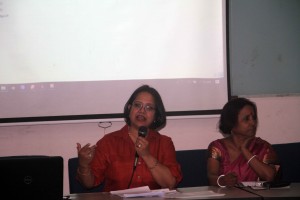 The notions of climate change-induced migration in general and climate-induced displacement, in particular, have become an important issue of discussion in recent times. In its latest assessment the AR5, the Inter-Governmental Panel on Climate Change (IPCC), has devoted an entire section explaining the complex relations between climate change and migration. The crisis of climate-induced displacement is already unfolding across the globe. Central America and portions of Mexico could be one of the regions dramatically affected by climate change in the coming decades. Papua New Guinean atolls, Tuvalu, Kiribati, the Maldives, Bangladesh and different parts of Africa have already begun to take various initiatives to address the crisis at the national level.
The notions of climate change-induced migration in general and climate-induced displacement, in particular, have become an important issue of discussion in recent times. In its latest assessment the AR5, the Inter-Governmental Panel on Climate Change (IPCC), has devoted an entire section explaining the complex relations between climate change and migration. The crisis of climate-induced displacement is already unfolding across the globe. Central America and portions of Mexico could be one of the regions dramatically affected by climate change in the coming decades. Papua New Guinean atolls, Tuvalu, Kiribati, the Maldives, Bangladesh and different parts of Africa have already begun to take various initiatives to address the crisis at the national level.
Climate change is a long drawn process. However, over the last couple of centuries, the change has been accelerated by the massive industrial growth in the industrial countries. The US and other industrialized countries with about 20% of world population are responsible for over 80% of world’s carbon emission. At the current rate of carbon emission, the average global temperature will rise between 3 to 5-degree celsius by 2050. A 3-degree celsius rise will increase the sea level as much as 1.3 meters compared to just 21 centimeters in the last 100 years.
Such temperature increase and sea level rise will dramatically displace communities with rapid onset processes such as storms, hurricanes, floods, heat waves and forest fires and slow onset processes such as drought, desertification, and sinking of coastal lands. Recent estimates suggest that by 2050 one in every 45 people (250 million) in the world will be displaced by climate change. The number of people already displaced by climate change is around 25 million.
Climate change may result in various types of population movement. Communities whose land would be submerged will be displaced and will have very little option but to move. Some of those who would lose their traditional livelihood will manage to stay in situ through migration of one of more members of their families and resultant remittance flow. The relatively well-off families may resettle in safer locations. However, a large number of people could be trapped as they may, on one hand, be barred from migrating either internally or internationally, or on the other, simply may not have the means to do so. These groups will be forced to continue to live in areas under threat where they will be extremely vulnerable to environmental shocks and impoverishment. The impact of climate change among the affected people will vary according to age, class, and gender.
Various studies have informed that climate change induced migration flows will mostly be internal. However, unfortunately, dominant view of policy makers, particularly of the developed countries, perceives the climate-induced migrants as threats to receiving areas. For example, “climate wars” is a fear-based narrative promoted by the US military. It claims that climate-induced displaced poor communities will engage in violent conflict over scarce resources, will storm the US borders or become terrorists. Such images are built upon fear and racism to increase resources for the militarization of the border and military expansion into other countries. Such militarization effort is getting support from anti-immigrant groups. The aim of this session is focused to build a more nuanced regional analysis.
It is in this context the PGA session on Climate Change and Migration would focus on four areas:
- Experiences of climate change induced a displacement in different countries and regions. National and regional strategies and action plans in addressing such displacement.
- National and regional experiences of planned and autonomous adaptation practices of governments, NGOs, and the affected communities.
- Country and regional experiences of identifying climate-induced migrants as a security threat.
- National and regional experiences of using livelihood migration by the climate change affected households as one of the many adaptation tools. The types of policy and actions required supporting such livelihood internal and international migration.
Possible recommendations
- Develop strategy to highlight both internal and international migration in the context of climate change is a right. Governments should recognize and prepare for that eventuality, bringing communities into the planning process.
- Development of a comprehensive multilateral framework for responding to climate change-induced displacement. It should incorporate programmes for all three stages: pre-displacement (prevention and preparedness for relocation), during displacement (humanitarian assistance and recovery) and post-displacement (durable solutions: return, local reintegration, and resettlement).
- Governments, NGOs and development partners should take the lesson of autonomous adaptation practices of individual households or communities to incorporate into their national strategies and action plans.
- A global campaign has to be launched against labelling migrants as security theat. Migration in general and climate change-induced migration, in particular, should be desecuritized.
- A priority should be placed on investments that increase resilience to climate change, such as maintaining and managing natural forests, natural coastal protections such as mangroves.
- In order to avoid high concentration of migrants in a few mega-cities urban growth centres should be decentralised. While developing urban growth centers living arrangement of service providers who are usually the migrant needs to be planned in close by peri-urban areas. These peri-urban areas should be designed with low-cost housing, educational institutions, medical facilities, access to safe drinking water, sanitation and electricity. Improved connectivity with urban growth centers should be established.
- Ensure that climate-induced migrants are not forced to take recourse to irregular migration and opportunities for migration through the regular channel is made available to them.
- Developed countries are to be pressured for reduction of carbon emission. Part of global funds that have been created for climate change adaptation should be spent on migration governance and protection of migrants.
Outcome documents of collective actions of BCSM
1. Reality and Dream Book Promo (e-book and Hard copy coming soon )
2. Policy Brief 20
3. Briefing Note Recommendations
